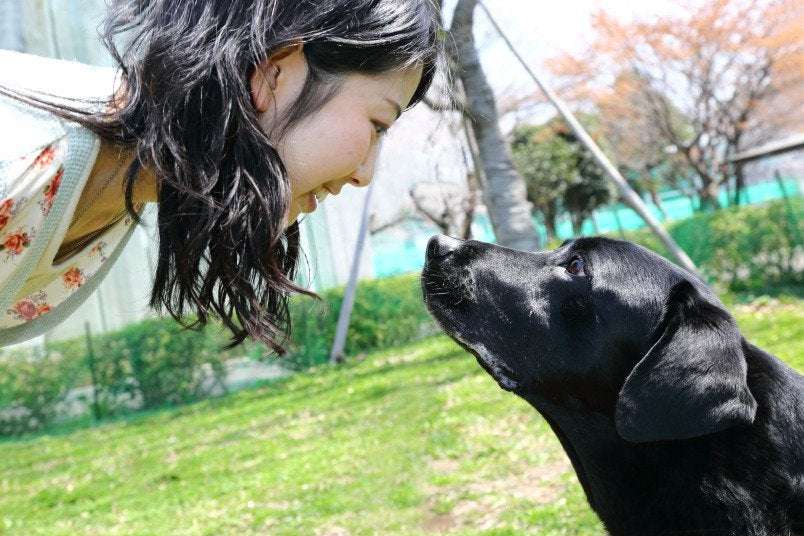Humans love their pet dogs in the same way as they do their children, and the feeling is mutual, scientists have discovered.
Researchers found that the same hormone, oxytocin, spikes in both human and canine brains when a dog is gazing at its owner.
Oxytocin is known to play a strong role in triggering feelings of unconditional love and protection when parents and children look into each other’s eyes or embrace.
So the findings suggest that owners love their pets in the same way as family members, and dogs return their devoted affection.
"These results suggest that humans may feel affection for their companion dogs similar to that felt toward human family members, said Dr Miho Nagasawa, from the department of animal science at Azabu University in Sagamihara, Japan.
"Oxytocin plays a primary role in regulating social bonding between mother and infants and between sexual partners."
• How to tell if your dog is really listening to you
• Video: Is your dog happy to see you? It's all in the eyebrows
The researchers from the University of Tokyo and Duke University in the US believe that oxytocin creates a ‘neural feedback loop’ that has strengthened the bond between man and ‘his best friend’ for millennia.
To test the theory, researchers put dogs in a room with their owners and documented every interaction between them, such as talking, touching and gazing.
• Bad dog owners to blame for aggressive animals not their breed
• Stray dog starts new life in Sweden after incredible journey from Amazon rainforest
They then measured levels of oxytocin in urine and discovered that increased eye contact between dogs and humans had driven up levels of the hormone in both species.
However when they performed the same experiments on wolves which had been raised by humans there was no spike in oxytocin, suggesting it evolved during the domestication process which began around 34,000 years ago.
Dr Evan MacLean, a senior research scientist at Duke University said that dogs had learned to ‘hi-jack’ the bonding pathway between parents and their children: “It’s really only in the last couple of thousand years that we have kept dogs as pets, and dogs began to be able to relate to humans in meaningful social ways.
“They became attuned to our social cues in the way that young children are. For example when dogs are presented with an impossible task they quickly turn to humans to see what to do, just like children do. Wolves don’t do that.
• Woman who left Kai the dog at Ayr station comes forward
“Our relationship with dogs are very much like parent child relationships. We respond to our dogs quite a bit like human children. Brain imaging studies have shown that brain networks of mothers respond in the same way to pictures of their own dog to their own children.
“One evolutionary scenario might be that dogs found a way to hijack these parenting responses and dogs over time may have taken on more childlike and juvenile characteristics to further embed themselves into our lives.”
The researchers say that the paper shows that dogs feel like a child of the family, rather than the underdog in a pack.
“I think the results of this paper wind very well with the parent, child model given that we know that oxytocin plays such an important role in parents bonding with their children,” added Dr MacLean.
In a second experiment, the researchers sprayed oxytocin directly into the noses of certain dogs and placed them in a room with their owners and some strangers.
Female dogs responded to the treatment by increasing the amount of time they gazed at their owners.
After 30 minutes, oxytocin levels had also increased in the owners of the treated dogs, the researchers report, providing further evidence for the feedback loop between owner and canine.
The research was published in the journal Science.

Xenton on October 6th, 2019 at 08:28 UTC »
God this is fucking romanticised.
There is no hormone for "unconditional love" and oxytocin is linked to a bunch of emotional and physiological phenomena within the body.
Oxytocin is also released when you're extremely anxious, when you wet yourself and during labour.
To call it the "unconditional love hormone" would be like calling chicken "The lunch vegetable".
sonofabutch on October 6th, 2019 at 03:47 UTC »
There’s actually a term for what happens when you want to say your youngest child’s name but instead say your oldest child’s name and then your middle child’s name and so on. (Or when you’re making sweet sweet love to someone but say your ex’s name even though you totally weren’t even thinking of your ex.)
It’s called misnaming and it happens because of the way your brain stores information. Think of it as boxes of information and in one box you keep your kids’ names and in another box you keep your sexy time names and so on, and when you’re rushing your brain just reaches into the box and pulls out the first thing it finds. Usually you get it right and don’t even think about it, but sometimes you pull out the wrong and goddamnit you’re on the couch again.
So anyway it turns out many times people misname their kids and dogs... they call the kid by the dog’s name or the kid by the dog’s name. This almost never happens with other pets.
It seems our brains are wired to think of dogs as family members!
HandRailSuicide1 on October 6th, 2019 at 03:42 UTC »
Commas, don’t work, like, this